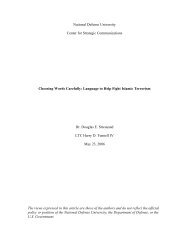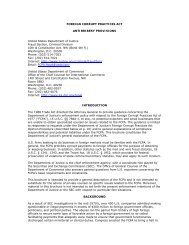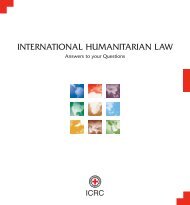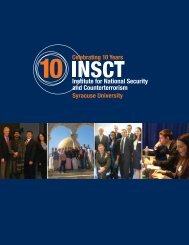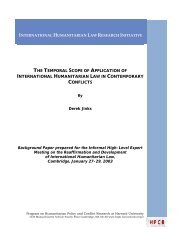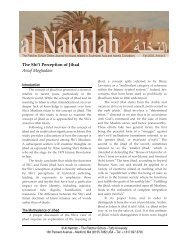1428 Michigan State Law Review [Vol. 2006:1403glect. Because Islamic theological asserti<strong>on</strong>s of human equality are so explicit,many Muslim intellectuals and Islamic law scholars are quite complacentabout critically exploring the basis, c<strong>on</strong>tent, and history of the ideaof equality. Many have literally taken the religi<strong>on</strong>’s egalitarian asserti<strong>on</strong>sfor granted. 98 Uncritical discussi<strong>on</strong>s of human equality in the commentariesof the can<strong>on</strong>ical tafsir feed this complacency. This is a near-tragic state ofaffairs because issues arising out of Muslim misc<strong>on</strong>cepti<strong>on</strong>s and misunderstandingsof human equality are at the heart of a number of c<strong>on</strong>troversiesaffecting the Islamic world today. 99equality principle emphasize dignity as the key substantive comp<strong>on</strong>ent of equality. See id.While I acknowledge that human dignity is an important aspect of the Islamic view of equality,I will argue that the Islamic c<strong>on</strong>cepti<strong>on</strong> is based firmly in a theocentric worldview andnot in a primarily humanitarian worldview, as many people have come to believe. In makingthis argument, I have benefited greatly from Louise Marlowe’s excellent study of the intellectualhistory of Islamic egalitarianism. MARLOWE, supra note 92. Professor Marlowe’sstudy appears to be the <strong>on</strong>ly important discussi<strong>on</strong> of the topic.98. See, e.g., MASHOOD A. BADERIN, INTERNATIONAL HUMAN RIGHTS AND ISLAMICLAW (2003); ABUL ‘ALA MAWDUDI, HUMAN RIGHTS IN ISLAM (2d ed. 1995); SULTANHUSAYN TABANDAH, A MUSLIM COMMENTARY ON THE UNIVERSAL DECLARATION OF HUMANRIGHTS (F.J. Goulding trans., 1970); Abdul Aziz Said, Precept and Practice of HumanRights in Islam, UNIVERSAL HUMAN RIGHTS, Jan.-Mar. 1979, at 63; see also WilliamShepard, The Development of the Thought of Sayyid Qutb as Reflected in Earlier and LaterEditi<strong>on</strong>s of ‘Social Justice in Islam’, 32 DIE WELT DES ISLAMS 196, 221-22, 224, 227-28(1992) (translating paragraphs 13, 14, 21, 22, and 33 of Sayyid Qutb’s Social Justice in Islam).99. Some of the issues implicating c<strong>on</strong>temporary c<strong>on</strong>cerns about Muslim c<strong>on</strong>cepti<strong>on</strong>sof equality are the racial programs and possible acts of genocide in Darfur, women’sfull participati<strong>on</strong> in political and ec<strong>on</strong>omic sectors of Muslim societies, particularly <strong>on</strong> theArabian Peninsula and in the Persian Gulf, gender equality in marriage and inheritance law,the Palestinian Questi<strong>on</strong>, the tremendous inequities suffered by imported guest workers,domestic servants, and other laborers <strong>on</strong> the Arabian Peninsula, and the treatment and participati<strong>on</strong>of n<strong>on</strong>-Muslim minorities in majority Muslim societies. For a discussi<strong>on</strong> of theproblems in Darfur, see Report of the Internati<strong>on</strong>al Commissi<strong>on</strong> of Inquiry <strong>on</strong> Darfur to theUnited Nati<strong>on</strong>s Secretary-General (pursuant to Security Council Resoluti<strong>on</strong> 1564 of 18 September2004), Geneva, 25 Jan., 2004. With respect to the treatment of Muslim Africantribespers<strong>on</strong>s in Darfur, the Commissi<strong>on</strong> found:Based <strong>on</strong> a thorough analysis of the informati<strong>on</strong> gathered in the course of its investigati<strong>on</strong>s,the Commissi<strong>on</strong> established that the Government of the Sudan and theJanjaweed are resp<strong>on</strong>sible for serious violati<strong>on</strong>s of internati<strong>on</strong>al human rights andhumanitarian law amounting to crimes under internati<strong>on</strong>al law. In particular, theCommissi<strong>on</strong> found that Government forces and militias c<strong>on</strong>ducted indiscriminateattacks, including killing of civilians, torture, enforced disappearances, destructi<strong>on</strong>of villages, rape and other forms of sexual violence, pillaging and forced displacement,throughout Darfur. These acts were c<strong>on</strong>ducted <strong>on</strong> a widespread and systematicbasis, and therefore may amount to crimes against humanity. The extensivedestructi<strong>on</strong> and displacement have resulted in a loss of livelihood and means ofsurvival for countless women, men and children. In additi<strong>on</strong> to the large scale attacks,many people have been arrested and detained, and many have been held incommunicadofor prol<strong>on</strong>ged periods and tortured. The vast majority of the victims
Special] Post-Enlightenment Qur’anic Hermeneutics 1429Thus, the meaning of equality in the core Islamic texts and the c<strong>on</strong>temporaryrelevance of Muslim historical understandings of those texts isfundamentally a problem in Post-Enlightenment <strong>hermeneutics</strong>. Scholars ofIslam might not like to acknowledge this fact but I suggest that it is undeniableand that it is <strong>on</strong>ly through the methods of critical legal history, with theassistance of a clear and uncompromising hermeneutical analysis, that wecan obtain help in providing <str<strong>on</strong>g>some</str<strong>on</strong>g> relevant c<strong>on</strong>temporary meaning to thetexts.The interpretati<strong>on</strong> of equality is not a problem that is unique to Islam.Philosophers of law and legal scholars operating in the modern Westerntraditi<strong>on</strong>, unlike scholars in the Islamic law traditi<strong>on</strong>, have devoted a greatdeal of critical attenti<strong>on</strong> to the theoretical basis, c<strong>on</strong>tent, and history ofegalitarian ideas in Post-Enlightenment societies. 100 Indeed, it may verywell be that the problem of human equality is the central problem in c<strong>on</strong>temporarypolitical life in these societies. Yet, even with all this attenti<strong>on</strong>,Western scholars still have great difficulty in making sense of their egalitariantraditi<strong>on</strong>s. As Professor George P. Fletcher noted, the modern claim thatevery<strong>on</strong>e is entitled to equal treatment actually leads “a double life.” 101 Onthe <strong>on</strong>e hand we never hear of any respectable argument against the coreasserti<strong>on</strong> that equality should be a central value of any robust and maturepolitical system.Yet, at the same time, there is a pervasive and deeply rooted skepticismam<strong>on</strong>g many scholars about the true meaning and viability of egalitarofall of these violati<strong>on</strong>s have been from the Fur, Zaghawa, Massalit, Jebel, Arangaand other so-called ‘African’ tribes.For a discussi<strong>on</strong> of the problems of racial inequality, slavery, and slavery-like c<strong>on</strong>diti<strong>on</strong>s inthe Islamic Middle East today, see Mohamed Mattar, Trafficking in Pers<strong>on</strong>s: EspeciallyWomen and Children in Countries of the Middle East: The Scope of the Problem and theAppropriate Legislative Resp<strong>on</strong>ses, 26 FORDHAM INT’L L.J. 721 (2003); see also Khaled AliBeydoun, The Trafficking of Ethiopian Domestic Workers into Leban<strong>on</strong>: NavigatingThrough a Novel Passage of the Internati<strong>on</strong>al Maid Trade, 24 BERKELEY J. INT’L L. 1009(2006); Dan Gatmaytan, Recent Developments: Death and the Maid: Work, Violence, and theFilipina in the Internati<strong>on</strong>al Labor Market, 20 HARV. WOMEN’S L.J. 229 (1997). On equalityfor women, see Samera Agha, Comparative Assessment of Women’s Rights, supra note 74;Perry S. Smith, Silent Witness: Discriminati<strong>on</strong> Against Women in the Pakistani Law of Evidence,11 TUL. J. INT’L & COMP. L. 21 (2003); Ferris K. Nesheiwat, H<strong>on</strong>or Crimes in Jordan:Their Treatment Under Islamic and Jordanian Criminal Laws, 23 PENN. ST. INT’L L. REV.251 (2004); Leah Riggins, Note, Criminalizing Marital Rape in Ind<strong>on</strong>esia, 24 B.C. THIRDWORLD L.J. 421 (2004). It is widely reported that between seventy and ninety percent of themarried women living in Pakistan are victims of domestic abuse and violence. See, e.g.,Human Rights Watch, Forms of Violence Against Women in Pakistan,http://www.hrw.org/campaigns/pakistan/forms.htm (last visited May 12, 2007).100. See, e.g., RONALD DWORKIN, SOVEREIGN VIRTUE: THE THEORY AND PRACTICE OFEQUALITY (2000); EQUALITY: SELECTED READINGS, supra note 96 (collecting essays);AMARTYA SEN, INEQUALITY REEXAMINED (1992).101. Fletcher, supra note 96, at 1608.



